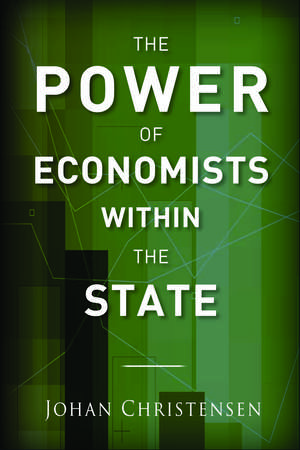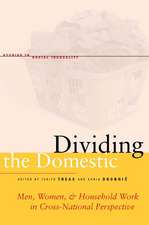The Power of Economists within the State
Autor Johan Christensenen Limba Engleză Hardback – 10 apr 2017
The spread of market-oriented reforms has been one of the major political and economic trends of the late twentieth and early twenty-first centuries. Governments have, to varying degrees, adopted policies that have led to deregulation: the liberalization of trade; the privatization of state entities; and low-rate, broad-base taxes. Yet some countries embraced these policies more than others.
Johan Christensen examines one major contributor to this disparity: the entrenchment of U.S.-trained, neoclassical economists in political institutions the world over. While previous studies have highlighted the role of political parties and production regimes, Christensen uses comparative case studies of New Zealand, Ireland, Norway, and Denmark to show how the influence of economists affected the extent to which each nation adopted market-oriented tax policies. He finds that, in countries where economic experts held powerful positions, neoclassical economics broke through with greater force. Drawing on revealing interviews with 80 policy elites, he examines the specific ways in which economists shaped reforms, relying on an activist approach to policymaking and the perceived utility of their science to drive change.
Johan Christensen examines one major contributor to this disparity: the entrenchment of U.S.-trained, neoclassical economists in political institutions the world over. While previous studies have highlighted the role of political parties and production regimes, Christensen uses comparative case studies of New Zealand, Ireland, Norway, and Denmark to show how the influence of economists affected the extent to which each nation adopted market-oriented tax policies. He finds that, in countries where economic experts held powerful positions, neoclassical economics broke through with greater force. Drawing on revealing interviews with 80 policy elites, he examines the specific ways in which economists shaped reforms, relying on an activist approach to policymaking and the perceived utility of their science to drive change.
Preț: 474.85 lei
Preț vechi: 586.24 lei
-19% Nou
Puncte Express: 712
Preț estimativ în valută:
90.87€ • 98.68$ • 76.33£
90.87€ • 98.68$ • 76.33£
Carte tipărită la comandă
Livrare economică 22 aprilie-06 mai
Preluare comenzi: 021 569.72.76
Specificații
ISBN-13: 9781503600492
ISBN-10: 1503600491
Pagini: 240
Dimensiuni: 152 x 229 x 21 mm
Greutate: 0.48 kg
Editura: Stanford University Press
Colecția Stanford University Press
ISBN-10: 1503600491
Pagini: 240
Dimensiuni: 152 x 229 x 21 mm
Greutate: 0.48 kg
Editura: Stanford University Press
Colecția Stanford University Press
Recenzii
"Christensen has written an eminently readable and important addition to the literature on neoliberal reform. This book is at once a contribution to the discourse on comparative tax regimes and a corrective to other arguments about the political sway of economists."—John L. Campbell, Dartmouth College, co-author of The National Origins of Policy Ideas
"Sometimes, economists seem almost irrelevant to policymaking. Other times, it is clear that they have enormous influence. In this outstanding book, Johan Christensen shows us how an unlikely factor—bureaucratic autonomy—accounts for the difference. All kinds of social scientists will want to read Christensen's deeply researched, rigorously argued explanation of what gives economics its power."—Elizabeth Popp Berman, University at Albany, SUNY, author of Creating the Market University
"A finely tuned and deeply knowledgeable account of the influence of economists over public policy in four countries. Full of surprises, the work shows how history and path dependence challenge what we thought we knew about each of these countries. A page-turner on tax policy is surely an event to celebrate."—Mark Granovetter, Professor of Sociology at Stanford University
Notă biografică
Johan Christensen is Assistant Professor in Leiden University's Institute of Public Administration.
Descriere
Why have some countries gone farther than others in adopting public policies that rely heavily on the free-market? Johan Christensen offers a new explanation: these policies are correlated with the entrenchment of U.S.-trained, neoclassical economists within that state. Comparing the cases of New Zealand, Ireland, Norway, and Denmark, he shows how the influence of economists helped to establish market-conforming tax regimes.











